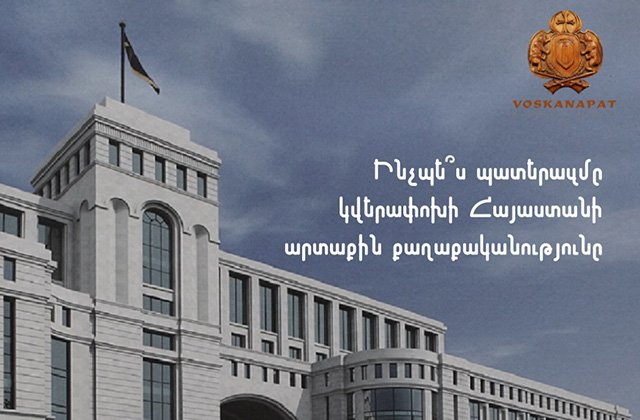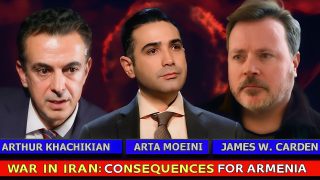How will the Second Karabakh War transform Armenian foreign policy?

The defeat of Armenia in the second Karabakh war dramatically altered the regional political arrangements that had shaped Armenia’s foreign and security policy. Prior to the independence of Armenia, a movement for the unification of Nagorno-Karabakh with Armenia, and then the victory in the 1990s defined the contours of Armenia’s foreign policy and international stance in general. But the 44-day war changed the facts on the ground. Henceforth, Armenian foreign policy will be implemented in a completely different environment and the revision of the core concepts of Armenia’s foreign policy is a matter of urgency.
Before the war
The main goals of Armenia’s post-independence foreign policy were the peaceful settlement of the Nagorno-Karabakh conflict and the security issues related to it. First and foremost the Nagorno-Karabakh conflict was the reason for hostile relations with two neighbors – Turkey and Azerbaijan. This forced Armenia to integrate deeply with Russia in security and economic spheres while having distant relations with the West.
Armenia-Russia
With fewer resources and in an unequal struggle with its neighbors, Armenia was the first post-soviet state to welcome Russia’s return and to meet its war needs by turning towards Russia. Armenia was the first country which let Russia keep its military base on its territory and signed the 1997 Treaty of Friendship and Mutual Assistance. The conflict forced Armenia to participate in Russian security and economic integration projects, the CSTO, and the EEU.
Armenia- the West
Armenia’s relations with the West were mostly related to democratic reforms, human rights and financial assistance. Trying to modernize its public and private institutions Armenia became a member of the Council of Europe and the EU Eastern Partnership. Armenia also benefited from the presence of the US and France in the Chairmanship of the OSCE Minsk Group as the issue of self-determination of the Karabakh people could be promoted through the active lobbying of the Diaspora in these countries.
Turkish factor
The Karabakh conflict also determined Turkey-Armenia relations. In 1993, during the first Karabakh war, Turkey closed its border with Armenia in solidarity with Azerbaijan. The Armenian-Turkish reconciliation process failed because Armenia refused to accept the Turkish preconditions of making concessions to Azerbaijan in Karabakh. Since its independence, Armenia has balanced the Turkish threat through its alliance with Russia.
After the war
The second Karabakh war created a new reality on the ground which should be taken into consideration when developing Armenia’s foreign policy;
- Armenia’s dependence on Russia has increased. The security of Karabakh currently depends largely on Russian peacekeepers. The war showed that only Moscow is willing to provide tangible support to Armenia.
- Turkey’s influence in the region has increased. Although there is a prospect of unblocking communications in the South Caucasus, Turkey is now considered a direct threat to Armenia more than ever.
- Western influence has significantly decreased in the region in contrast to the Russian-Turkish presence. The OSCE Minsk Group has lost the capacity to affect the situation on the ground.
Nevertheless, the decisive factor in Armenia’s foreign policy remains the conflict over Karabakh. Several important changes have taken place since November 9;
- The international context of the conflict has changed. Since 1992 many countries have been involved in the negotiation process: Russia, the USA, France, Turkey, Iran, etc. Since this war, Russia and Turkey have assumed a leading role. The Western countries remain largely isolated from the ongoing processes. Moreover, the OSCE Minsk Group is effectively paralyzed, the functioning of which was in Armenia’s best interests.
- The balance of power of the conflicting parties has changed. If in the past Armenia was the winning side, today it is the opposite. The main goal of the Armenian side – the status of Karabakh, is quite difficult to resolve from the current position, if not impossible.
- The parties involved in the conflict are not interested in resolving the status issue immediately. Russia is in favor of a half-solution, which allows the closing of the military phase of the conflict in its “backyard”, but does not completely eliminate the “reason” for having peacekeepers. President of Azerbaijan, Ilham Aliev is satisfied with his achievements, with which he can keep his power for many years to come. Armenia is exhausted and defeated, and the decision on the status issue will not be in its favor. The security of the Armenians in Karabakh will be ensured as long as Russia is willing to have peacekeepers there.
A new foreign policy?
Armenia’s foreign policy will operate in a new regional environment. The global competition over the South Caucasus has turned into a regional one. Armenia has to weaken the complementary part of its foreign policy. The vectors should be aimed at deepening relations with Russia and making qualitative changes in cooperation with neighboring countries.
To contain Turkey and Azerbaijan, Armenia should develop a new quality of allied relations with Russia. That should imply such a combination of Armenian-Russian interests, that Turkey and Azerbaijan will be prevented from posing a threat to Armenia and Karabakh.
The unblocking of communications may create a new Armenian-Turkish agenda, in particular a necessity to open the borders and establish diplomatic relations. Considering the facts that the Russian side had no objections in the Armenian-Turkish reconciliation process in 2008 and Turkey’s preconditions on the Karabakh issue are no longer relevant, such an agenda may return to the negotiation table.
Under the new circumstances, political relations with the West obtain interesting nuances. Moscow believes that the negotiations on the Nagorno-Karabakh conflict should continue within the framework of the OSCE Minsk Group and expects Western support in resolving humanitarian issues. As the West is interested in voicing its position on the status of Karabakh, as evidenced by the French Senate resolution, Armenia can use this opportunity to neutralize Turkish-Azerbaijani goals through Russia-West cooperation.
Epilogue
The new reality is a challenge for Armenian political experts and scholars. Specialists have a responsibility to ask questions and give answers as effectively as possible. As an epilogue, we post some questions for further discussions;
- What will the South Caucasus look like after the war? Will Azerbaijan deepen relations with Turkey in military and political terms?
- How does Iran see its role in restraining Turkey’s ambitions in the South Caucasus?
- In the context of the growing role of Russia and Turkey, what are the preconditions for Tbilisi-Moscow reconciliation? How can Tbilisi pursue a more favorable foreign policy towards Armenia?
- What threats will Armenia face if the border with Turkey is opened? Is the unblocking of communications beneficial for Armenia?
- Will the Armenian-Russian relations evolve to a new level? If there are new initiatives from the Russian side, how should Armenia respond to those proposals? Does Russia intend to further expand the activities of its integration structures if communications are unblocked in the region?
Davit Matevosyan,
Hovsep Babayan,
Voskanapat Analytical Center
November 30, 2020

























